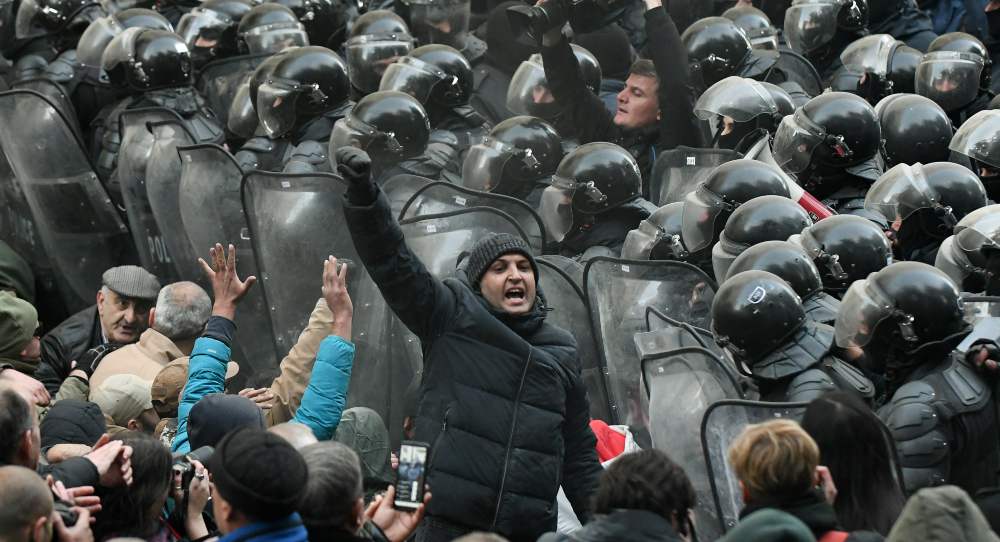This blog is part of EU-LISTCO, an innovative and timely project that investigates the challenges facing Europe’s foreign policy. A consortium of fourteen leading research institutions and universities aims to identify risks connected to areas of limited statehood and contested orders—and the EU’s ability to respond.
***
It’s a repetition Georgia could do without.
This strategically important country in the Caucasus has been beset by yet another political crisis. This time, the catalyst was the government’s failure to follow through on its promise to reform Georgia’s electoral system.
On November 14, with 101 votes in favor and three against, the Georgian Parliament voted down a bill that would have replaced the country’s mixed electoral system with a fully proportional one before next year’s parliamentary election.
The reform, initially proposed as a solution to previous political crises, had been hailed by international and domestic observers as a key step toward the consolidation of Georgia’s struggling democracy.
The decision by Georgian Dream, the ruling party, to allow the vote to fail provoked an immediate reaction both in and outside the country. It also created even more political frustration domestically and internationally. The opposition and youth movements have been on the streets demanding the reversal of the decision and have called for snap elections. The government’s position remains unchanged.
This electoral reform is very important. If implemented, it’s a chance to consolidate Georgia’s democracy. The country has often been hailed as a democratic frontrunner in the region. Yet twenty-eight years after independence, it has never managed to consolidate its democratic structures and at best remains a hybrid regime.
Apart from the politicized judiciary, the ruling party’s extensive access to state resources, and the executive-dominated vertical of power, the mixed electoral system is considered to be the main reason behind Georgia’s single-party tradition.
This is because such a system always makes it easy for the ruling party to throw its consolidated support behind its candidates in the seventy-three single-member districts—which make up almost half of the 150-seat parliament—in order to defeat opposition candidates.
As a result, Georgian Dream, in power since 2012, received 48.68 percent in 2016 in proportional elections, but nonetheless managed to take 115 of the total 150 seats due to the overwhelming victory of Georgian Dream candidates in the single-member districts.
The majoritarian system was used by previous governments under Mikheil Saakashvili and Eduard Shevardnadze to ensure their supermajority in the parliament. This is why the reform of electoral legislation is the key to escaping the vicious circle of one-party politics and establishing European-style multiparty and consensus-based democracy.
Georgia’s reforms and its democratic success matter for the EU for three reasons.
First, Georgia is considered one of the few success stories of the otherwise moderately successful European Neighborhood Policy and Eastern Partnership initiative, the two key instruments of EU external governance in the Eastern neighborhood. With Moldova and Ukraine—the other two associated states with decent democratic credentials—not in good shape , Georgia’s slide toward authoritarian democracy would undermine the last remaining poster child of the EU’s soft power in the region.
Second, the possible autocratic consolidation also undermines the EU’s key goal in its neighborhood: political stability and peaceful development. Unlike some of the other neighborhood states, the societies in countries like Georgia and Ukraine have grown pluralist by default and, therefore, any attempt at imposing autocratic governance produces more political turmoil and a public backlash.
Third, if the backsliding continues, Georgian democracy will more likely drift toward illiberal actors such as Russia and China. This is not the aspirations of Georgian society.
Recent harsh criticism by Georgian authorities toward the NGO community and Western organizations such as the National Democratic Institute and the International Republican Institute is something done usually by authoritarian governments critical of the West.
If this trend continues it may be the first sign of a cooling of the relations between the West and Georgia. What is needed instead is for Georgia to accelerate its Europeanization and democratic transformation. That should be the strategic goal of both the West and Georgia.
So what’s next? With a parliamentary election expected in autumn, 2020 could become a critical year for Georgia’s democratic development—as well as for the future of its European aspirations.
The stakes are high. The ruling party seems to have sacrificed its internal, societal credibility as well as its international image to keep the current electoral system in place.
Should Georgian Dream manage to win, it will be the first time since Georgia’s independence in 1990 that the same party has remained in power for three consecutive terms. The weak and fragmented opposition may not help Georgia’s democracy flourish. And its numerous institutional weaknesses could become an unsurmountable obstacle for further democratization of Georgia and the region.
To make things worse, both Georgian Dream and the main opposition party, the United National Movement, contribute to a polarized political environment that makes it difficult for other political parties to engage in a fair competition.
That is why the EU has an important role to play. Regardless of who wins, the EU—together with the United States—should ensure that the election next year is held in a democratic and transparent manner and that political competition between the government and opposition rests within the constitutional boundaries.
This requires more active engagement from the EU and member states. Considering its high support among the Georgian population, the EU could become an honest broker to ensure Georgia’s sustainable democratic development.
Georgia’s friends in the West also need to understand that by helping Georgia they also invest in the further democratization and stability of the wider region.
Kornely Kakachia is the director of the Georgian Institute of Politics.
Bidzina Lebanidze is a senior analyst at the Georgian Institute of Politics.






.jpg)
.jpg)

